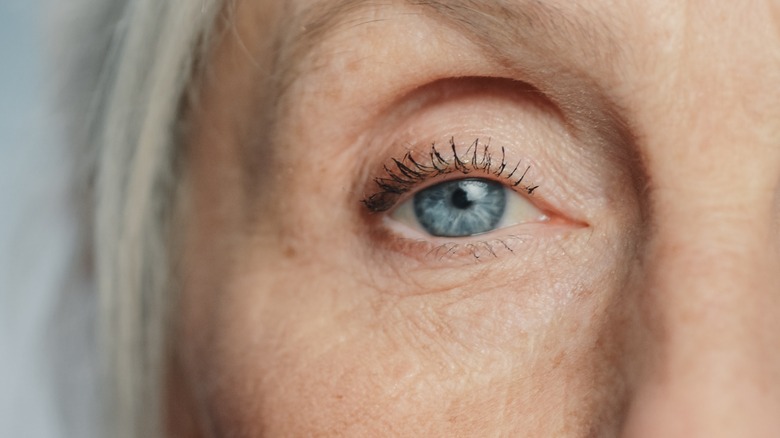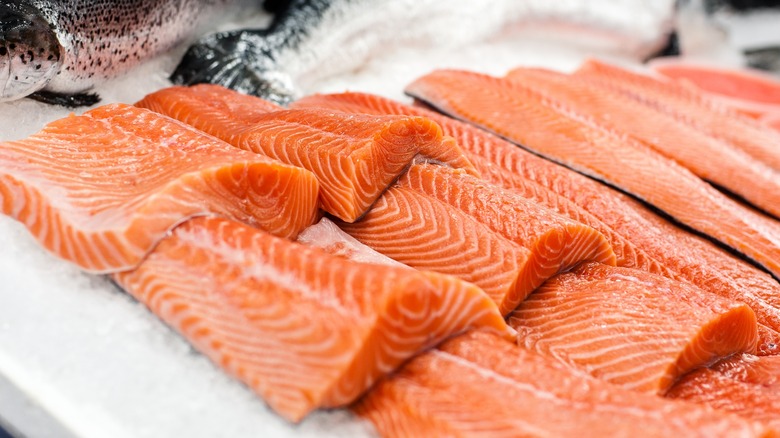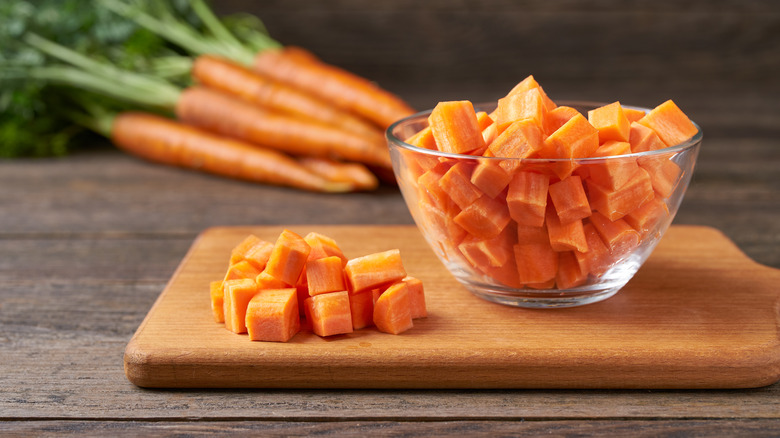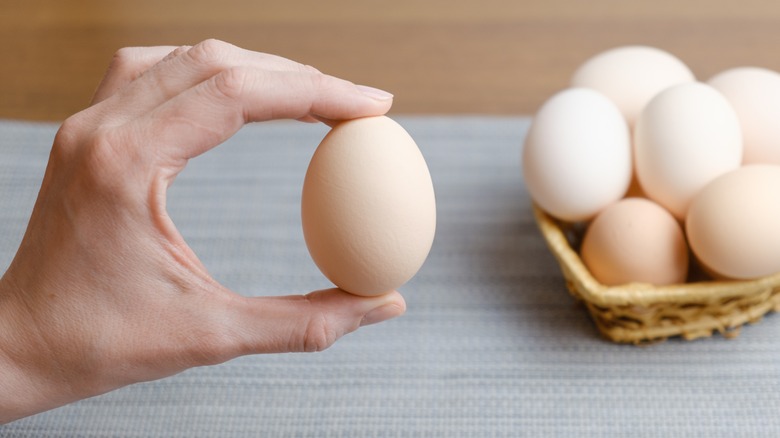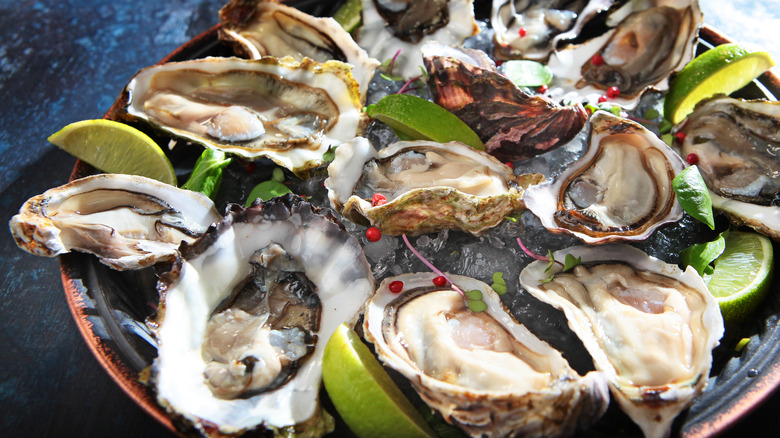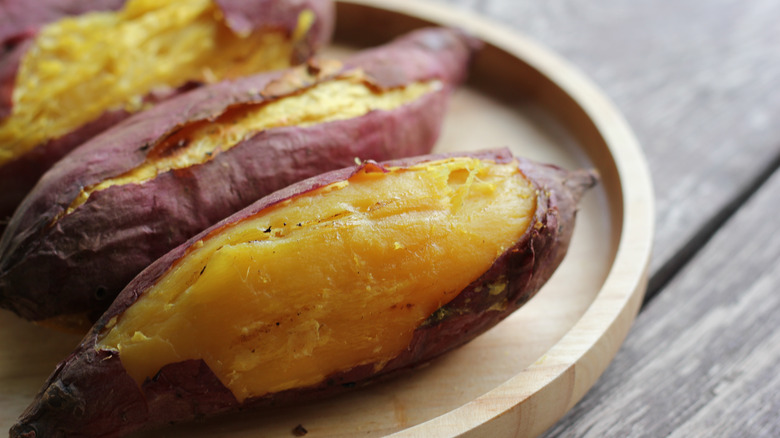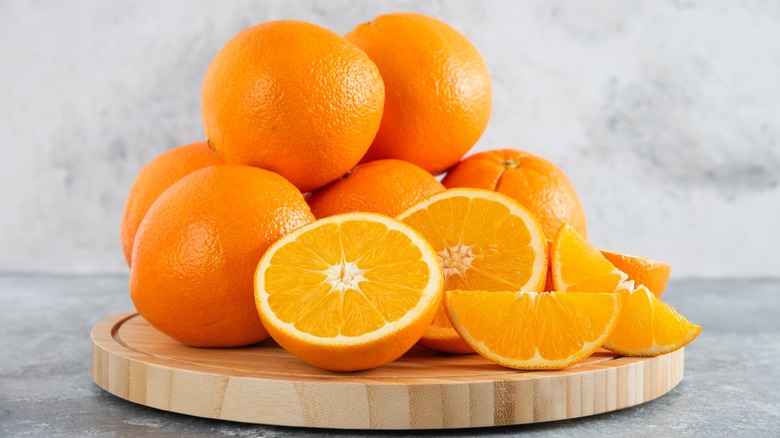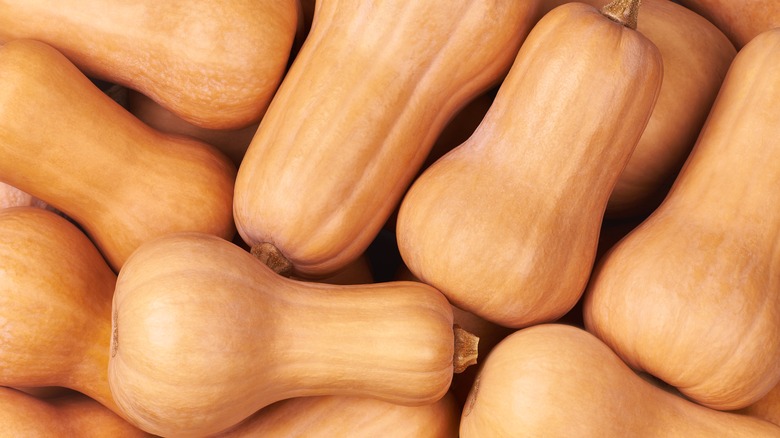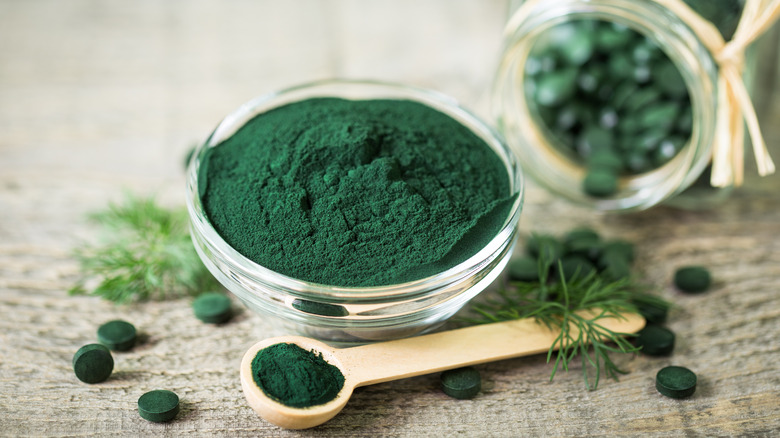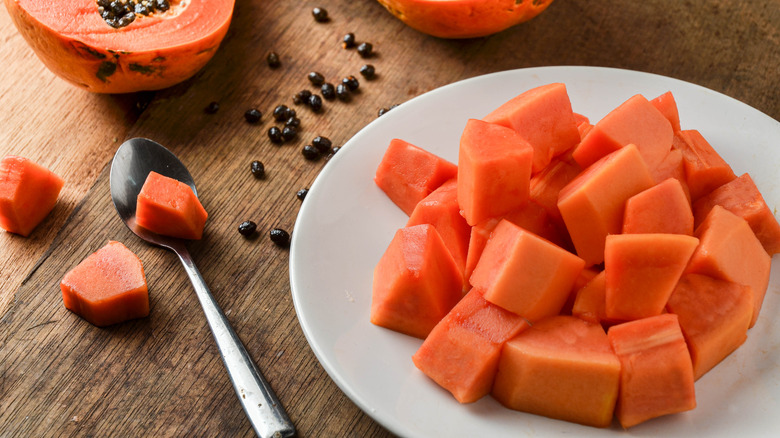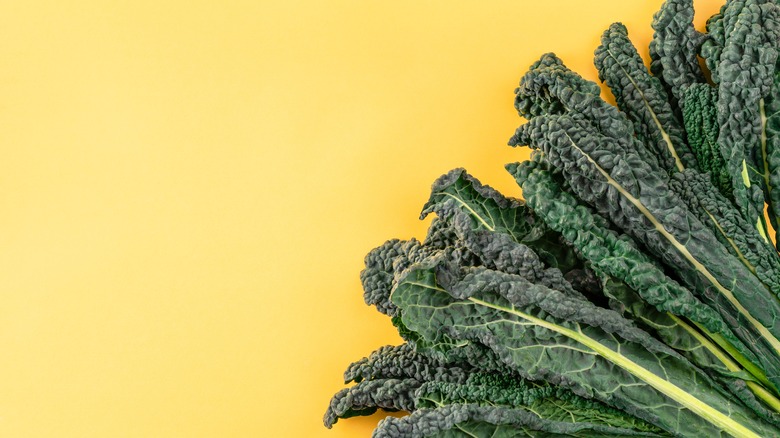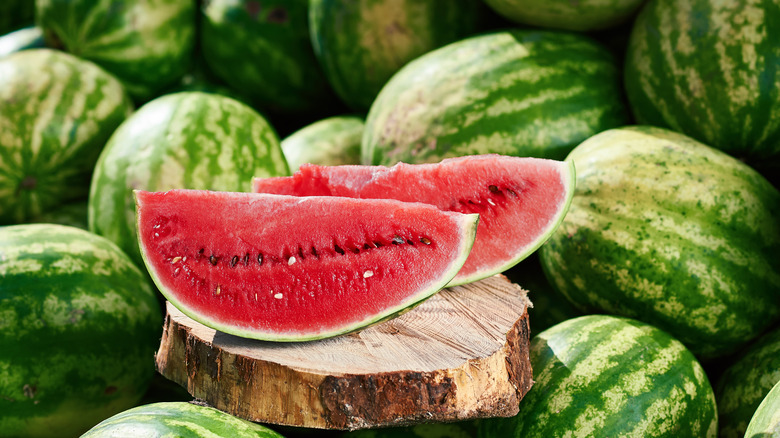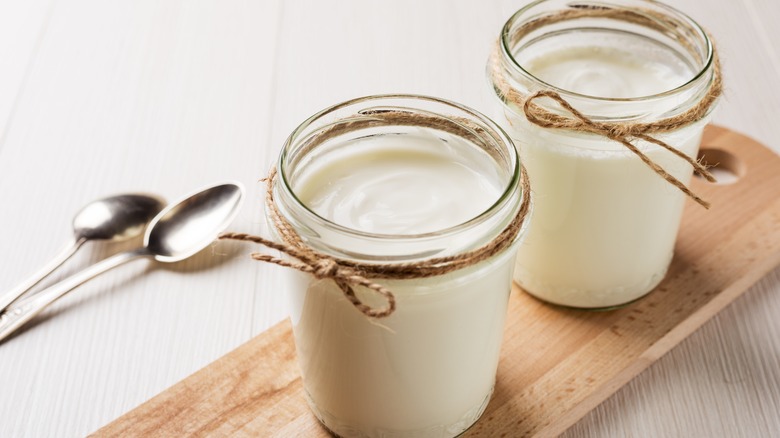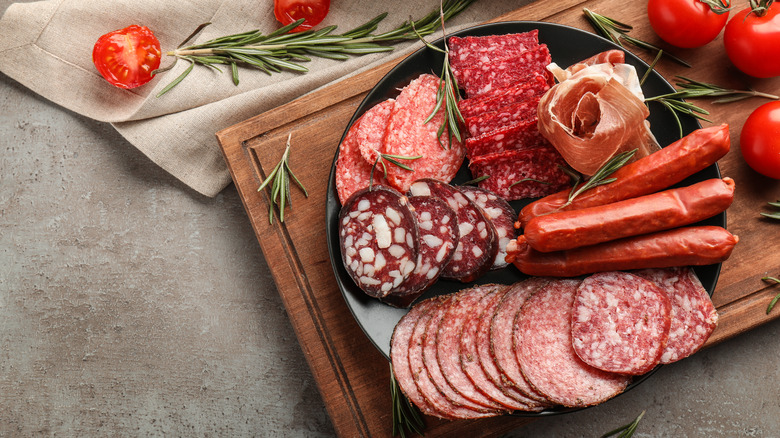13 Foods To Eat For Healthier Eyes
Are you wearing glasses right now? If you are, you're not alone — and in fact, you're in the majority. While 20/20 vision might be the gold standard for eyesight, in the United States it's relatively uncommon, with over three-quarters of all Americans, or almost 200 million people, using vision correction products (per the Vision Council). And there is also a large number of folks who experience more serious vision impairment, with around 12 million of those over 40 having some form of vision impairment, as the Centers for Disease Control and Prevention (CDC) shows.
As such, learning to look after our eyes throughout our lives can be vital to keep our eyesight as good as it can be. And as with most things in life, it can all start with what you eat. Our day-to-day diets are responsible for the healthy maintenance of our bodies, and this includes our eyes (via Medical News Today) — and learning what to eat to keep them healthy may serve you well later in life, when vision loss becomes a common health issue (via American Family Physician). That's why we decided to put together a list of the foods you'll want in your grocery cart. Let's dive in.
Salmon
Including fish in your diet several times a week is recommended by a range of experts due to its abundant benefits for your health (per the Harvard T. H. Chan School of Public Health). And if you're in the fish aisle, it's hard to find a healthier choice than salmon. Providing a seemingly endless list of positives for your health — keeping your cells functioning correctly, safeguarding your immune system, and regulating the function of your thyroid — salmon is also one of the best things you can eat for your eyes, as Healthline says. Salmon's packed with vitamin A, an essential vitamin that not only can assist in preventing the development of myopia (otherwise known as nearsightedness, when you can see things close to you well but struggle to make out far-away objects), but may help keep your night vision robust, according to the American Optometric Association (AOA).
But there's more up salmon's sleeve than just vitamins. Arguably its star component, the omega-3 that's so plentiful in this vibrant fish can also provide your eyes with a beneficial boost. As research published in Nutrients shows, omega-3 fatty acids may deliver protective effects against the risk of age-related macular degeneration, and can also help to reduce the occurrence of dry eye disease. Praise be to the salmon!
Sunflower seeds
Honestly, sunflower seeds are pretty rad, folks. Who'd have thought that something so small could have so much goodness packed into it, and also be able to produce such a beautiful flower too? We love the versatility.
And when it comes to your eyes, sunflower seeds have you covered too. The seeds are an excellent plant-based source of omega-6 fatty acids, according to Harvard Health Publishing. These fats can be helpful for eye health, with supplementation of omega-6's and omega-3's found to be useful in treating dry eye syndrome, as per research published in the Saudi Journal of Ophthalmology. But it's their vitamin E content that really puts sunflower seeds front and center for your eye health, as WebMD discusses. A powerful antioxidant with the power to fight against free radical damage in the body, it was found in a study published in the Archives of Ophthalmology that taking vitamin E, alongside several other nutrients, could slow down the progression of age-related macular degeneration. It could also be the case that eating a diet high in vitamin E sources may reduce the risk of cataracts, says Healthline. Alongside sunflower seeds, other seeds and nuts can also provide you with your daily dose of vitamin E, with peanuts and hazelnuts being especially rich in the antioxidant (via WebMD).
Carrots
So let's see a show of hands, here: How many of you were told that carrots make your eyes better when you were a kid? All of you? Yeah, that's what we thought. There is perhaps no other food that's as associated with good eyesight as the humble carrot, but as it turns out, there's truth to the claim, as the University of Utah discusses.
Carrots are especially rich in beta-carotene, the pigment which gives the vegetable its bright orange color, and which is present in other orange and yellow foods like sweet potatoes and peppers (incidentally, "beta-carotene" comes from the Latin word for "carrot," says Mount Sinai). When we eat beta-carotene, it's converted into vitamin A by our bodies, and it's this vitamin A that gives our eye and vision health such a big boost. More specifically, this vitamin A could have positive implications for people who have age-related macular degeneration, but even for those who do not, it's vital to keep your body stocked up in this essential vitamin. "If you don't have AMD, we don't see a need to take high-dose supplements, but no matter what, it is always wise to focus on a good heart- and eye-healthy diet," in which carrots should be a key component, says Paul Bernstein, professor of ophthalmology and visual sciences at the University of Utah.
Eggs
In our opinion, we think eggs are underrated. You might be slightly surprised to hear us say that, considering they're one of the most common foods in the world, but think about it: How often do you consider the nutrition of your eggs beyond their protein and fats?
However, two things are lurking in eggs that give them particular potency for your eyes: lutein and zeaxanthin, per research published in Clinical Nutrition. These two powerful antioxidants are in especially high concentration in your eyes, particularly around the retina, lens, and macula, and they keep your eyes guarded against damage from ultraviolet rays, as WebMD discusses. Lutein and zeaxanthin may also provide benefits against longer-term eye conditions, too — and that's where eggs come in. The research in Clinical Nutrition examined the effects of eating eggs regularly over fifteen years and found that when people ate between two and four eggs a week, their risk of developing age-related macular degeneration (or AMD) was reduced by over 50%. For people who ate even more eggs, around five or six a week, their chances of developing the condition were even lower, with a 65% decrease in incidence. Not bad for a few eggs, right?
Oysters
Okay, so we know that oysters may not be on the menu for a lot of people every day. But rest assured that when you order that plate of oysters for date night, you're not only going to be feeling very fancy, you'll also be doing your eyes a big favor.
Oysters have the highest level of zinc of any food, with a frankly wild amount delivered per serving. Three ounces of oysters will provide you with just over 74 milligrams of zinc, which is (wait for it) 673% of the recommended daily amount, according to WebMD. And this mineral is highly important for your eye health, as Medical News Today notes. The structure of your eye and its retina are all bolstered by zinc, and it's also instrumental in the processing of vitamin A in your body. When vitamin A, aided by zinc, is moved into your eye, it creates melanin, which then guards your eye against damage from UV rays. Regular zinc intake could also protect your eyes later in life and help fight against age-related diseases like AMD. While oysters win big in the zinc stakes, remember that it's entirely possible to get it from other food sources too, with other seafood, meat like beef and pork, and plant-based sources like cashews and chickpeas all delivering the mineral (via WebMD).
Sweet potatoes
Sweet potatoes do more than just look good (and taste good) on your plate. These tubers are one of the best foods you can eat to protect your eyes. A single sweet potato will deliver approximately one and a half times the amount of vitamin A that you need in a day, according to EatingWell, and your eyes will love you for it, thanks to the vitamin's ability to protect your cornea. Vitamin A is also a component of rhodopsin, a pigment that resides in our retina and allows us to detect and process light, as research published in the journal Acta Pharmacologica Sinica discusses.
Sweet potatoes are also a great source of vitamin C, as Healthline notes, which is another essential vitamin for eye health, thanks to its ability to support the lens in its function (per research published in Nutrients). And, aside from all of these eye-boosting benefits, it's important not to forget that sweet potatoes are really good for you in other ways. Their high fiber levels can provide your gut with a wealth of health, and certain antioxidants that reside in sweet potatoes may also prove instrumental in supporting brain function (via Healthline).
Oranges
At the first sign of a cold or the flu, reaching for an orange is common practice for millions of people around the country. But although we're taught that vitamin C is one of the best things you can be consuming for your immune system, it's also got a powerful function when it comes to the eye and its health. Vitamin C is particularly important to support vision and prevent the development of cataracts, as the American Optometric Association discusses. The fluid around the lens in your eye is abundant in the vitamin, and the vitamin C helps to stop the oxidization of the lens, which can lead to decreased function (per Healthline).
Vitamin C also works with other vitamins and nutrients to assist in reducing vision loss in older age, and conditions like age-related macular degeneration. And with around 68 milligrams of the vitamin per orange — well over two-thirds of the amount we should be consuming per day (per Mindbodygreen) — eating the fruit is an easy way to keep your levels topped up. It's also worth remembering that a range of other fruits and vegetables, including potatoes, tomatoes, bell peppers, and other citrus fruits, are also rich in the vitamin, says the Harvard T. H. Chan School of Public Health.
Squash
Ah, the squash. So unassuming, and so humble. But whether your squash or summer or winter, pumpkin or acorn, you might find that this fruit is the food that your eyes craved all along. Squash fruits are positively jammed with nutrients that are beneficial for your eye, as WebMD discusses. Squashes of all kinds contain the antioxidants lutein and zeaxanthin, which are essential for eye health and the maintenance of the retina and lens. And they're also full of vitamin C, which again works to keep your lens in good shape.
And depending on what type of squash you opt for, and what time of the year it is, they'll also benefit your eyes in different ways. In the summertime, seasonal squashes are rife with zinc, and if you're chowing down on winter squash, you'll be getting a strong vitamin A source. Both nutrients serve to protect your eye. And if you thought that was it ... well, folks, we have one more trick up our sleeves. Winter squash contains a generous serving of omega-3 fatty acids, with approximately 332 mg per cup serving, according to Eat This, Not That!.
Spirulina
Spirulina used to be the reserve of the health brigade, but these days it's showing up in a wide range of recipes, as it's just as at home in your smoothies as it is in your puddings and ice creams (per Insanely Good). And that's very, very good for your eyes. The algae is a source of a lesser-known omega-6 fatty acid called gamma-linolenic acid, or GLA, says Mount Sinai. This fatty acid is especially interesting as, unlike other omega-6 fats, GLA can actually reduce inflammation throughout the body, and may even have a bolstering effect on your DNA's structure.
And these anti-inflammatory effects could have powerful positive consequences for your eyes. Consuming GLA could assist in preventing dry eye disease, as Healthline points out. It could also benefit your health in a huge amount of other areas, protecting against osteoporosis, promoting your skin health, and potentially fending off rheumatoid arthritis, as Mount Sinai discusses. Spirulina is also full of antioxidants and other nutrients like magnesium, and may even serve to keep your heart health and immune system in check, says WebMD.
Papaya
The papaya may not be your go-to fruit, but we can think of some pretty good reasons why you should reach for one next time you're in the supermarket. And one of those reasons is its effects on your eyes. Papaya is a particularly powerful ally for eye health, thanks in part to its lycopene content (per EatingWell). In addition to providing the papaya with its unique color, lycopene may also assist in slowing down the growth of cataracts.
Papaya is also abundant in vitamin C, with a huge amount of antioxidants delivered per serving. This vitamin C then works to both protect the lens and fight against free radicals, which exist in higher quantities in the eye, and also may serve a purpose in boosting the eye-protecting effects of other nutrients. But one of the best things about papaya? It's a super-versatile fruit that's as delicious on its own as it is in a savory recipe. Try pairing papaya with beef and a tamarind soy dressing, or throwing it into a salad with leafy greens and avocado for a superfood lunch, as BBC GoodFood suggests.
Kale
Kale is on the shopping list of pretty much every food and fitness influencer out there, and the reason for that is more than just their stocks in Big Kale. Kale is incredible for your health in more ways than we can count (via WebMD), and your eyes benefit from it enormously, too. One of the main reasons why kale is so beneficial is thanks to its antioxidant content, with the leafy green abundant in lutein and zeaxanthin (per Healthline). Supplied through the body only through dietary sources, lutein and zeaxanthin can help fight against age-related macular degeneration, an eye condition that occurs when your macula becomes compromised due to aging, resulting in a worsening of central vision (per the National Eye Institute). The condition affects approximately 11 million people in the United States, according to the BrightFocus Foundation.
The vitamin C that comes in your cup of kale could also provide protective benefits to your eye. You may not know it, but kale is actually one of the richest sources of vitamin C out there, with a cup of kale delivering more bang for your vitamin buck than an orange, says Healthline.
Watermelon
On the surface of things, watermelon might not seem particularly nutritious. Sure, it's delicious and refreshing, but something that's mainly water can't exactly be some magic elixir for your eye, can it? Well, it's that 92% water content that could work to keep your eyes healthy (per Vision Direct). Eating foods that contain water keeps us topped up on our hydration levels, and this water then helps your eyes to function properly, as the Florida Retina Institute discusses. Lose too much water from our system and dehydration occurs, which can be seriously damaging for your eyes. Dehydration also reduces our levels of glutathione, an essential antioxidant that protects your eye health, as a study published in the journal Life shows.
But watermelon isn't just water, and it has an additional component that could prove exciting for your eyes: vitamin A (per Vision Direct). This vitamin content, when consumed, makes its way to our eyes and protects parts of the retina, which in turn aids in the fight against age-related macular degeneration. Watermelon is also packed with essential minerals and vitamin B6, which is vital for hormone regulation, so it's a real health all-rounder.
Yogurt
Dairy has had a pretty rocky reputation in recent years, with more and more people opting to veer away from it entirely, potentially down to its saturated fat content (via Foods). But not all dairy is alike, and certain dairy products like yogurt could actually be pretty good for you, particularly for your eyes (per Healthline). Yogurt contains several essential components for eye health, such as vitamin A and zinc. The two work together to keep your eyes healthy, with the zinc transporting the vitamin A to your peepers and allowing it to do its thing. Even on its own, zinc is important for the structure of your eye, including your retina and your choroid, the central tissue layer in the eye and the part that carries blood to the retina (per All About Vision).
Dairy's potential to protect eye health was observed in a study published in the European Journal of Nutrition. The study found that amongst older people who ate skimmed yogurt, the risk of cataracts was "significantly lower." The authors proposed several reasons why skimmed yogurt could be particularly beneficial for cataracts, from its lower fat content to its potential anti-inflammatory effects.
Which foods aren't good for eye health?
While there are a lot of foods out there that can be great for your eyes, the opposite can also be true, and it's important to be on your guard about which foods you really shouldn't be eating. Especially salty foods can wreak havoc on your eye health, according to WebMD. When you consume sodium-laden snacks and deli meats regularly, you raise your risk of higher blood pressure. This can lead to a range of complications for your eyes, including fluid buildup and damage to your eye's blood vessels that can affect vision (also called hypertensive retinopathy). Certain meat products also have the double disadvantage of being loaded with trans fats, which produce free radicals which may contribute to long-term eye conditions.
And you should also watch out for starchy carbs, too. Eating carbs like white bread and white rice causes your blood glucose to rise quickly, and doing this consistently over time can increase the risk of developing age-related macular degeneration. The same thing can also occur when you're consuming too much simple sugar, through sweet treats like candy or full-fat sodas.

